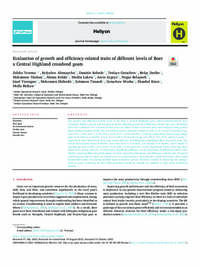Evaluation of growth and efficiency-related traits of different levels of Boer x Central Highland crossbred goats

Authors:
The growth and efficiency-related traits of the Boer x Central Highland goats raised semi-intensively were evaluated. Besides, genetic and non-genetic factors affecting growth and efficiency-related traits were identified. Data were collected over a period of nine years in a flock of Boer crossbred goats and analyzed using general linear model procedure of SAS. The overall least-squares mean live weight at birth, 3-, 6-, 9- and 12 months of age were 2.52 ± 0.01, 9.81 ± 0.13, 13.8 ± 0.15, 17.8 ± 0.19, and 20.5 ± 0.29 kg, respectively. The average weight gains from birth to 3 months, 3 to 6, 6 to 9 and 9–12 months of age were 80.3, 37.5, 41.9, and 31.2 g day−1, respectively. Boer blood level, birth type, season and year of kidding had a significant effect on growth traits. The overall least-squares mean of Kleiber ratio from birth to 3 months, 3–6 months, 6–9 months, and 9 month to yearling age were 13.99 ± 0.11, 5.23 ± 0.14, 4.66 ± 0.16, and 2.95 ± 0.18, respectively. Parity, birth type, Boer blood level, season and year of birth had a significant influence on the expression of efficiency-related traits (Kleiber ratios) in different growth phases. In terms of growth performance and efficiency-related traits, F2 and F3 crossbred goats did not show any benefit over F1 crossbred goats. Increasing Boer blood level above 50% would be worthless under the existing minimal input production system. Therefore, besides to improving the management of goats, producing the first filial generation would be suitable for medium to high input production systems.
